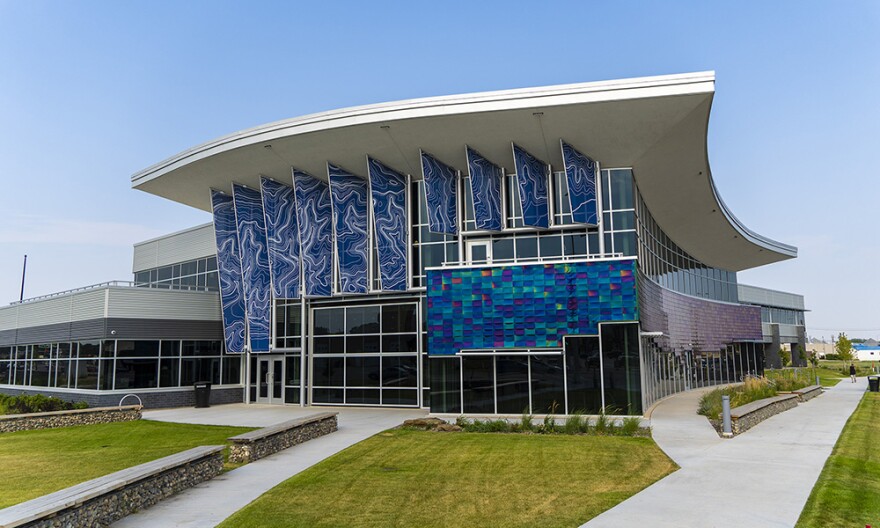A congressional report found that South Dakota suffers one of the nation’s highest rates of brain-drain, when large numbers of highly educated people leave a state.
Some of that drain happens at South Dakota Mines in Rapid City, where graduates with science and engineering degrees can’t always find a job or help with starting a business within the state.
"What they found is they were losing the students at the School of Mines to larger cities and so they needed a place to try to grow entrepreneurs and not lose those kids," said Tom Johnson, CEO of Elevate Rapid City, an economic development organization.
The university, city and private businesses responded by opening Ascent Innovation in 2006. The on-campus building provides space and networking for tech startups.
Ascent Innovation eventually outgrew its space, and Elevate Rapid City began working on a bigger center.
Elevate recently celebrated the grand opening of the David Lust Accelerator Building in downtown Rapid City. The building is named after the attorney and former lawmaker who unexpectedly died in July. Lust played a key role in developing Elevate and the new incubator building.

"If you build the infrastructure for these entrepreneurs they will stay," Johnson said. "But there's all these wraparound services that we provide entrepreneurs that we can give them access to as well. So it’s an ecosystem, if you will, of providers and services that Elevate can access and we make sure that anybody that’s in that incubator — or even if you're not in the incubator, if you’re just in Rapid City and you need help — we’ll help find it for you.”
The building will provide office, lab and meeting space for new startups. Tenants can rent for up to five years as they raise capital and develop their business. They can also receive advice and learn about funding opportunities from economic development agencies within the building.
Jared McEntaffer grew up in Pierre and moved to Rapid City to work for Benchmark Data Labs at the old Ascent Innovation building.
“If you’re in an incubator like this you can ask and talk to all these people that are going through all the same issues and troubles and success that you are. And so you have access to those conversations and the ability to tap into the knowledge," he said.
Another success story is Property Meld. The founders wrote their business idea on a napkin in Baltimore, Johnson said. One of the founders was a Mines graduate, and they moved back to Rapid City after learning about Ascent Innovation.
“Then they graduated out of the incubator into a downtown space, grew into 40, 50 and now they’re building a new space in downtown that’s going to be about a $14 million corporate headquarters," Johnson said. "Next year we anticipate they’ll have about 100 to 160 jobs all because of an incubator, all because of an idea.”
Johnson, McEntaffer and others toured the accelerator building during the grand opening. It’s a unique and modern structure that reflects the cutting-edge startups being developed inside.
The silver building has stainless steel panels that shimmer like fish scales. The panels change between purple, blue and other cool colors as they reflect the sunlight.

“They wanted a building that had a 'wow factor’ to it," said architect Peter Tan. "Not just an ordinary building, a building that inspires people to creativity, inspires people to come up with good ideas. So a building that did that but also a building that was truly Rapid City, that was unique to Rapid City, that took some of the most unique things about Rapid City, that's hyper local as well."
Meeting rooms have wallpaper of the Badlands and kaleidoscope-like patterns of agate rocks. A mural and sunshades are decorated with a topographic map of the city.

Past the entryway is a tiered seating area that mirrors the layers of an open-pit mine. Across is a garage door that opens to a grassy lawn. It has seating made of gabion walls, which are wire containers filled with rocks. Both places are for meeting and networking, and the outdoor area can host food trucks.
The front of the building is home to Elevate Rapid City, the Governor’s Office of Economic Development and the Ellsworth Development Authority.
The back is a flexible space with room for up to 25 startups. The floors are left unfinished so tenants can tailor the rooms to their needs.

Elevate, South Dakota and the federal government contributed a combined $15 million for the building. Rapid City donated 4.3 acres of land that Elevate hopes to fill with other buildings. The plan is to create a tech startup campus.
“I think Rapid City should be known as the Silicon Prairie," said Mayor Steve Allender. "There is a way of life here, a quality of life that I don’t think is easily found other places. And we have the right business climate, we have the right overall environment for innovation and entrepreneurs and that’s what’s important.”
"Rapid City has something that nobody else has in the world which is those Black Hills," Johnson said. "World class mountain biking, world class hiking, we've got a cool downtown, our beer and pub scene is hopping, our coffee house scene is kicking. So we're starting to see a lot more people interested in coming to Rapid City. So we needed that infrastructure because if they got here and they didn't have facilities like this, they might go somewhere else."
Elevate wants to sell the old Ascent building to South Dakota Mines, pending legislative approval. Johnson said Elevate will continue to have close relations with the university and provide internship opportunities for students.


